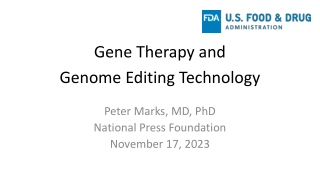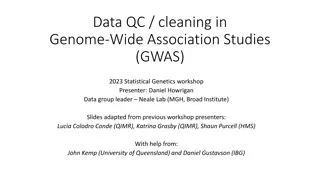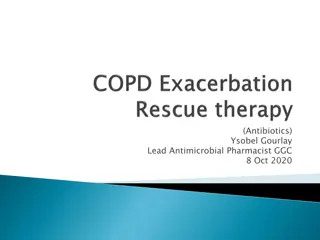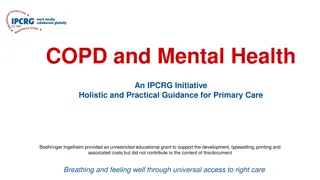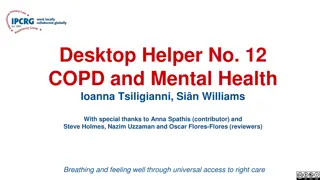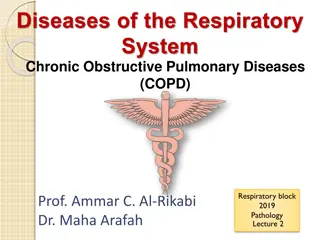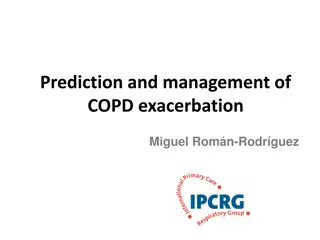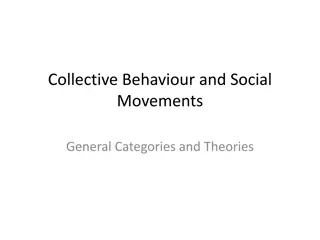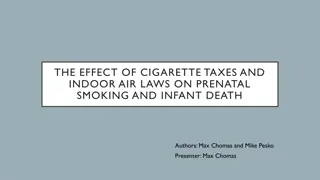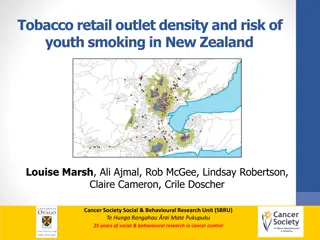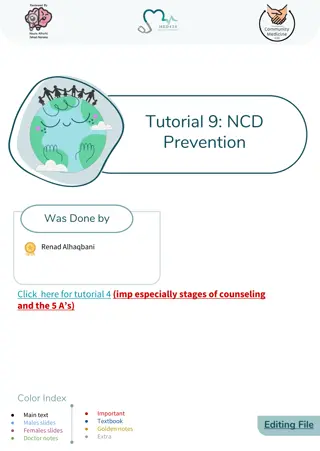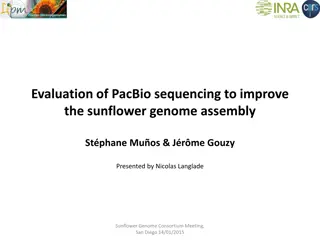Genome-wide association studies of smoking behaviour and COPD
Genome-wide association studies explore the relationship between genetic variants and smoking behavior in COPD. Dr. Mesut Erzurumluoğlu and the Boehringer Ingelheim Pharma Human Genetics team in Germany discuss the genetic basis of smoking, single nucleotide polymorphisms (SNPs), alleles, and their impact on individual traits. The study delves into the vast complexity of our 3 billion base-pair genome, highlighting the importance of understanding genetic variations in smoking habits and COPD susceptibility, shedding light on potential drug targets and biological pathways through GWAS, fine-mapping, and variant effect predictions.
Download Presentation

Please find below an Image/Link to download the presentation.
The content on the website is provided AS IS for your information and personal use only. It may not be sold, licensed, or shared on other websites without obtaining consent from the author.If you encounter any issues during the download, it is possible that the publisher has removed the file from their server.
You are allowed to download the files provided on this website for personal or commercial use, subject to the condition that they are used lawfully. All files are the property of their respective owners.
The content on the website is provided AS IS for your information and personal use only. It may not be sold, licensed, or shared on other websites without obtaining consent from the author.
E N D
Presentation Transcript
Genome-wide association studies of smoking behaviour and COPD A. Mesut Erzurumluo lu Boehringer Ingelheim Pharma Human Genetics team (Biberach an der Ri , Germany) @mesuturkiye bit.ly/mesutblog Erzurumluoglu, Liu and Jackson et al, 2020. Mol Psy Dr Mesut Erzurumluoglu, Boehringer Ingelheim, Germany
DISCLOSURES Commercial Interest Relationship(s) Boehringer Ingelheim Pharma Working for Boehringer Ingelheim as Senior Scientist in the Human Genetics team (located in Biberach, Germany) @mesuturkiye bit.ly/mesutblog Dr Mesut Erzurumluoglu, Boehringer Ingelheim, Germany
Our genome 3 billion base-pairs long Made up of Adenine (A), Guanine (G), Cytosine (C) & Thymine (T) Inherit a copy each from our parents >99.5% similar Some variants are widespread in the population Single nucleotide changes (incl. SNPs) represent the largest group of variants Sugar backbone Dr Mesut Erzurumluoglu, Boehringer Ingelheim, Germany
Alleles Chr. 1 INDIVIDUAL N C C C 100,000 C C C SNP 1 100,001 A A A G G G 100,002 T T T T T T SNP N AA AG GG SNP: Single nucleotide polymorphism (single nucleotide change that is relatively common in the population) Genotypes Dr Mesut Erzurumluoglu, Boehringer Ingelheim, Germany
Genome-wide association study (GWAS) INDIVIDUAL N A A A G G G AA AG Smokes GG Does not smoke Smokes a lot Dr Mesut Erzurumluoglu, Boehringer Ingelheim, Germany
Alsaadi and Erzurumluoglu et al, 2014. Hum Mut Wain et al, 2017. Nat Genet Shrine, Guyatt, and Erzurumluoglu et al, 2019. Nat Genet Erzurumluoglu, Liu and Jackson et al, 2020. Mol Psy Dr Mesut Erzurumluoglu, Boehringer Ingelheim, Germany
Manhattan plots from Wain et al, 2017 FEV1: Forced expiratory volume in 1 second FVC: Forced vital capacity References: 54 -> 97 genetic associations: Wain et al, 2017. Nat Genet 140 -> 279 genetic associations: Shrine, Guyatt, and Erzurumluoglu et al, 2019. Nat Genet Dr Mesut Erzurumluoglu, Boehringer Ingelheim, Germany
GWAS to biology and drug target Trans-ethnic GWAS Other -omics studies Variant effect prediction Druggability Protein-Protein interactions Fine-mapping Causal SNP(s) Target Gene(s) Relevant Tissue(s) Pathways e/pQTL studies Pathway enrichment Colocalisation Disease & drug targets Mendelian Randomisation GWAS associations Dr Mesut Erzurumluoglu, Boehringer Ingelheim, Germany
Smoking GWAS to drug targets for COPD Increase smoking (by reducing aversive effects of smoking? Jensen et al, 2015) Increase inflammation, abnormal cell repair, extracellular matrix destruction Decrease in CHRNA5 expression? Brain Cortex? rs1051730 (A)? Therapy Prevention Obstruction GWAS association at 15q25 COPD Dr Mesut Erzurumluoglu, Boehringer Ingelheim, Germany
Drug target validation: CHRM3 CHRM3 for chronic obstructive pulmonary disease (COPD) Muscarinic cholinergic receptor 3 (encoded by CHRM3) controls smooth muscle contraction Increased smooth muscle contraction => airway obstruction Evidence: High eQTL-GWAS colocalisation in lung and smooth muscle cells & desirable direction (inhibition => lower disease risk) Mendelian Randomization between CHRM3-specific eQTLs and COPD risk => significant association Pathology mechanism: Exaggerated acetylcholine release => enhanced expression of downstream signalling components in airway smooth muscle => bronchoconstriction Treatment: Acetylcholine receptor inhibitors Reverse the action of (vagally derived) acetylcholine on airway smooth muscle contraction Incl. anticholinergic drug Ipratropium by Boehringer Ingelheim Induced bronchodilation => Lowers bronchospams Mostly from Wain et al, 2017. Nat Genet Dr Mesut Erzurumluoglu, Boehringer Ingelheim, Germany
Drug repurposing: ITGAV for COPD? The allele associated with reduced expression of ITGAV was associated with increased lung function, suggesting that inhibitors of v 6 integrin might also have a beneficial effect in COPD ITGAV encodes a component of the v 6 integrin heterodimer, which is inhibited by a monoclonal antibody in development for pulmonary fibrosis (NCT01371305) and for which the small molecule GSK3008348 (NCT03069989) is an antagonist Shrine, Guyatt, and Erzurumluoglu et al, 2019. Nat Genet Dr Mesut Erzurumluoglu, Boehringer Ingelheim, Germany
Possible off-target effects Finemapping + PheWAS Atacicept blocks B cell stimulation by TNFSF13 to reduce systemic lupus erythematosus disease activity (in a Phase 2b trial) but may also reduce lung function Shrine, Guyatt, and Erzurumluoglu et al, 2019. Nat Genet Drug target invalidation:harmful REV3L for smoking cessation DNA polymerase in brain? Many potential drug targets identified for COPD Chemotherapy drug\carcinogenic Erzurumluoglu, Liu and Jackson et al, 2020. Mol Psy Dr Mesut Erzurumluoglu, Boehringer Ingelheim, Germany


